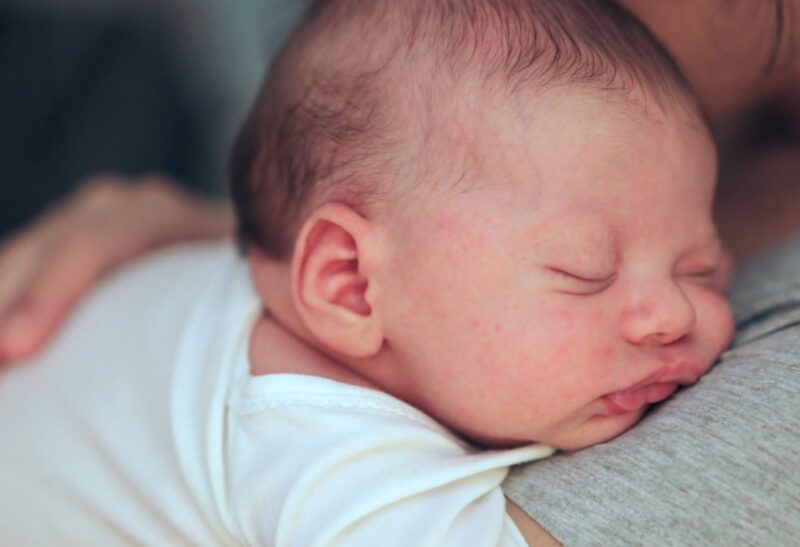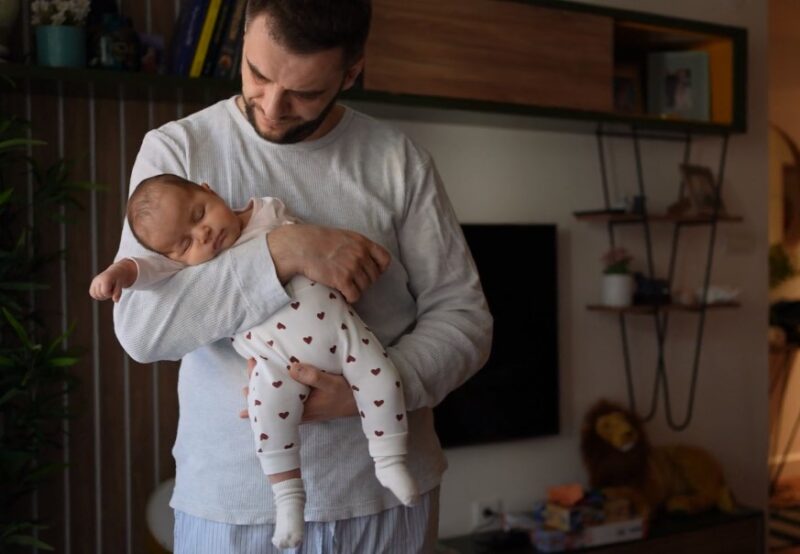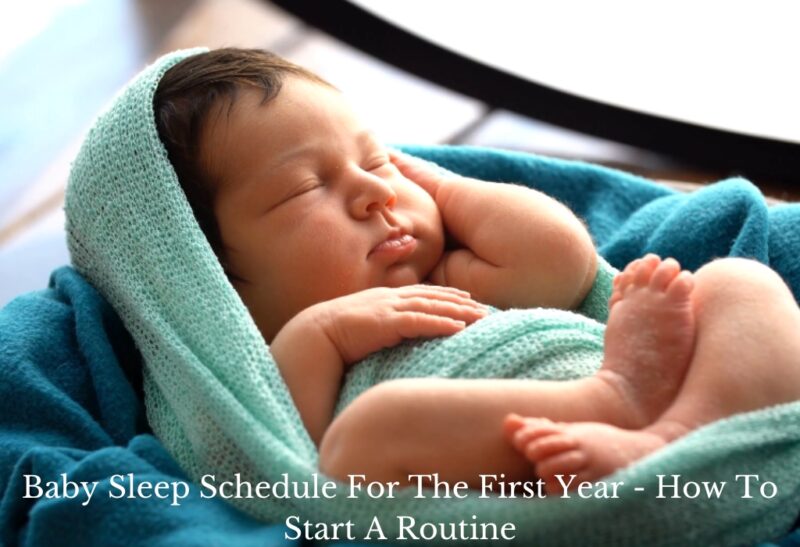Every new parent has that one big question: When will my baby start sleeping through the night? If you’re asking yourself this question, you’re not alone! In this comprehensive guide, we’ll break down your baby’s sleep schedule for the first year, offering you invaluable insights into their sleeping patterns and providing practical tips to help you navigate this fascinating journey.
0-3 Months: The Newborn Stage

In the first few weeks of life, your baby’s sleep schedule is erratic, which is completely normal. Newborns usually sleep 16-18 hours a day, but they don’t know the difference between day and night. They wake up every 2-3 hours to eat, so parents, get ready for some sleepless nights!
Tips for this stage:
- Establish a routine: Start simple rituals like a bath, a book, or a lullaby before bedtime to signal that it’s time to sleep.
- Feed on demand: Since your newborn’s stomach is tiny, they’ll need to eat frequently, even during the night.
3-6 Months: The Transitional Phase
This stage is a transitional phase. Around 3-4 months, your baby starts to develop a more predictable sleep schedule. They will start sleeping longer stretches, typically 4-6 hours at night, and their total sleep time might decrease to 14-16 hours a day. You might also notice them starting to sleep more during the night than during the day, thanks to the maturing of their circadian rhythm.
Tips for this stage:
- Develop a bedtime routine: Continue with your rituals and consider adding new ones. This could be a soothing massage or a gentle swaddle.
- Daytime feeds: Encourage more feeding during the day to help your baby sleep longer at night.
6-9 Months: The Consolidation Phase

At this stage, most babies begin to consolidate their sleep, sleeping for longer stretches at night, usually around 6-8 hours, and taking 2-3 naps during the day. Their total sleep time might decrease further to 12-14 hours a day.
Tips for this stage:
- Establish regular nap times: This will help maintain a consistent sleep schedule.
- Self-soothing skills: Start encouraging your baby to self-soothe. This could involve giving them a security blanket or a favorite toy.
9-12 Months: The Established Schedule Phase

During this stage, your baby’s sleep schedule becomes more established. They’ll usually sleep 10-12 hours at night and take 2 naps during the day. Some babies might start transitioning to one nap a day towards the end of the first year.
Tips for this stage:
- Consistent bedtime: Maintain a consistent bedtime, even on weekends.
- Transition smoothly: If your baby is transitioning to one nap, do it gradually. Start by shortening one of the naps before eliminating it altogether.
A Note on Sleep Regression
Remember that all babies are unique, and so are their sleep schedules. They also go through sleep regressions, periods when they wake up more frequently due to growth spurts or developmental milestones. These can happen around 4 months, 8-10 months, and 12 months. Be patient and flexible during these times.
Bonus Tips: Creating a Healthy Sleep Environment

To further enhance your baby’s sleep quality and pattern, it’s essential to create a healthy sleep environment. Here are some bonus tips to help you achieve that:
- Adequate Room Temperature: Maintain a comfortable room temperature, ideally between 65-70°F (18-21°C). Overheating can make your baby uncomfortable and disrupt their sleep.
- White Noise: Consider using a white noise machine. The consistent sound can soothe your baby to sleep and block out other potentially disturbing noises.
- Darkness: Babies sleep better in the dark. Use blackout curtains or an eye mask to keep the room dark, especially during daytime naps.
- Safety: Make sure your baby’s sleeping area is safe. The American Academy of Pediatrics recommends that babies sleep on their backs on a firm sleep surface, with no loose bedding or soft objects in the sleep area.
Special Considerations: Sleep and Feeding
A baby’s sleep schedule and feeding schedule are closely linked, especially in the first few months when they wake up frequently for feedings.
Breastfeeding Babies: Breastfed babies may wake up more often for feedings, as breast milk is digested more quickly than formula. Don’t hesitate to feed your baby whenever they seem hungry, and remember that this intense feeding schedule won’t last forever.
Formula-Feeding Babies: Formula-fed babies might sleep for longer stretches at a time because formula takes longer to digest. However, every baby is different, and there’s no guarantee that formula feeding will mean more sleep for you or your baby.
Understanding Baby Sleep Cycles

Let’s delve deeper into the science of sleep to better understand your baby’s sleep schedule. Unlike adults, babies spend more time in REM (Rapid Eye Movement) sleep, which is a lighter sleep stage and a time of high brain activity where most dreams occur. This is why newborns’ sleep often appears restless. As babies grow, the amount of time spent in non-REM sleep increases, which is a deeper and more restorative sleep stage.
The Role of Sleep Hormones
Two hormones play a vital role in regulating sleep: Melatonin and Cortisol.
Melatonin is often called the “sleep hormone.” It’s produced when it gets dark to help us feel sleepy. Newborns start producing melatonin around 2-3 months of age, which aligns with the development of their circadian rhythm. This is also why establishing a dim, quiet nighttime routine can be beneficial.
Cortisol, often known as the “stress hormone,” helps us wake up and stay alert. Its levels are highest in the early morning and gradually decrease throughout the day.
Effects of Overstimulation on Sleep
Babies can become overstimulated by too much activity or stress, which can make it harder for them to fall asleep or stay asleep. It’s important to create a calm and soothing environment, particularly before bedtime. Look out for signs of overstimulation, like fussiness or hyperactivity, and respond by reducing noise, dimming lights, or engaging in quiet, calming activities.
Sleep Aids: What Works and What to Avoid

Certain items can aid in establishing a sleep routine or providing comfort. These include:
- Pacifiers: Pacifiers can be a helpful self-soothing tool. However, be cautious of creating a dependence that could lead to sleep disruptions when the pacifier falls out.
- Sleep sacks and swaddles: These provide a sense of security and can help newborns sleep better. Ensure they are used safely to avoid overheating or suffocation risks.
However, it’s recommended to avoid certain sleep aids:
- Sleep positioners: These are not considered safe and are not necessary for your baby’s sleep.
- Stuffed animals and loose blankets: For infants under a year, these can pose a suffocation risk and should be kept out of the crib.
Cultural Differences in Sleep Practices
It’s worth noting that sleep practices can differ greatly among cultures. For example, co-sleeping is common in many Asian cultures, while Western cultures often encourage independent sleep early on. These practices can be safe when done correctly, but always consult your healthcare provider when making decisions about your baby’s sleep.
Frequently Asked Questions (FAQs)

1. When should I seek professional help with my baby’s sleep?
If your baby is having extreme difficulty sleeping, or their sleep patterns change suddenly or drastically, it’s a good idea to consult with a healthcare provider. They can rule out any medical issues that might be affecting your baby’s sleep.
2. Can I sleep train my baby?
Sleep training is a personal decision, and there’s no one-size-fits-all answer. Some families find that sleep training methods help their baby sleep better, while others prefer a more gradual approach.
3. How can I cope with sleep deprivation as a new parent?
It’s important to take care of yourself, too. Try to nap when your baby naps, ask for help from friends and family and remember that it’s okay to let some non-essential tasks slide for now. This period of intense sleep disruption is temporary.
Final Thoughts
Adjusting to your baby’s sleep schedule in the first year can be a roller-coaster of joy, anxiety, anticipation, and, yes, sleep deprivation. It’s essential to understand that your baby’s sleep patterns will change rapidly during this period, but these changes are part of your baby’s natural growth and development.
Remember, every baby is unique, and there’s no perfect sleep schedule or routine that fits all. What’s important is to find a routine that works best for your baby and your family. With love, patience, and understanding, you’ll navigate through this magical first year just fine. Here’s to sweet dreams and restful nights!






